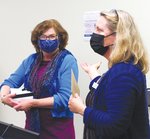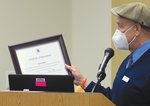

Susan Hardy’s last day at the Chatham County Council on Aging was last Friday. It came the day after her co-workers hosted a “going away” event for her at the Chatham Community Library and a few weeks after Chatham Commissioners honored her with a resolution recognizing her “strong work ethic and remarkable talents” and the “tremendous contributions she has made to Chatham County seniors, their families, and the entire community.”
Hardy leaves her position as the COA’s human services team leader and caregiver specialist after nearly seven years with the organization. She played a number of other vital roles for the COA, made more relevant because of Chatham’s growing aging population.
Upon the occasion of her retirement, the News + Record spoke to Hardy about her time and experience at the COA and what’s next for her and the organization.
The tasks involved in caregiving are pretty much the same. The role of a caregiver was difficult in 2015 and it is still a difficult role to assume in 2021.
What has changed is the emphasis on the importance of the caregiver and the vast amount of information and attention the media covers regarding dementia. Hopefully, all this attention will spill over to those who know a caregiver and cause them to empathize with the caregiver and step in to help. And with all this information available, the caregiver, or person helping the caregiver, can research and find resources out there on how to deal with the various behaviors they may encounter with a person living with dementia and suggestions on how to tackle these caregiving tasks in a safe and healthy manner.
I think we have learned that we need to provide as much support as possible for the caregiver in the home. Most of us want to remain in our homes and die in our homes. This makes it particularly important to pay attention to the caregiver’s needs and support them so they can continue caring for their loved one in the home.
The Council on Aging has developed a team of staff members, along with programs, whose sole purpose is to provide as many services as possible in the home. Something as simple as providing incontinence supplies from the N.C. Diaper Bank has helped many caregivers. Not only do caregivers drop by the Center to get adult diapers, but they also get bed pads and sanitary wipes. Another example of services to help caregivers in the home is our Minor Home Repair Volunteers program. By installing grab bars in a shower in the home, this team of highly qualified volunteers can alleviate the need for the caregiver to be in the shower to assist their loved one.
And how have the needs of caregivers changed? I see caregivers today needing to cast a wider net for obtaining help and support. I think back to my grandmother, and how she automatically assumed the role of caring for my grandfather, who was living with dementia. She had always been a homemaker and never worked outside of the home. Today many caregivers are working outside the home when they are confronted with the role of becoming a caregiver. They must choose between stopping work prematurely or finding help outside of the home.
Sometimes there is no choice. The lack of finances leaves them no choice, or if the money is there, then the lack of available qualified help in their community requires them to stop working and take on the full-time caregiver role. In our very mobile world, often there are no family members living near the caregiver. Also, families are smaller which leaves one or two carrying the load. My grandmother was able to receive some support and relief from her large family of seven children and the fact that all but one of her children lived within a 30-mile radius from the childhood home.
The aging of the baby boomers, the effects of COVID on our health care workers, couples choosing careers over having children, and the restrictions the U.S. has in place on immigrants are factors, when combined, can only add to the stress put on the health care agencies who were already experiencing a shortage of certified nursing assistants available to serve our aging populations. This shortage will only increase as the growth of our elderly population overpowers our shrinking younger population.
Reach out for help. Call the Council on Aging to find out about the programs and services offered there. Call on your extended family, faith community and other groups who can provide help. If a person is uncomfortable sitting with your loved one, allow them to run errands for you.
Lynn Parks will be taking on my position of Human Services Team Leader and Caregiver Specialist. She has over 10 years of experience in counseling and is a Certified Dementia Practitioner. She has been engaged in training with me for the past five months. Chatham’s COA clients can expect a person who is a compassionate listener and diligent worker, who is very capable of leading a team of staff members with the common goal of serving the caregivers and their loved ones. I am confident that she and the Human Services Team members will strive to provide the support the caregivers and their families need to continue living safely in their homes in Chatham County.
When I began working at the COA, I recognized the high standards that were already in place. By the examples I saw in the staff and leadership all around me, I was encouraged to give my best. I also knew that this would be the last career I would tackle, and I wanted to make sure I left something behind to be proud of.
The title of Caregiver Specialist was the role I embraced the most. I carried with me the memory of my grandmother, who had neglected her own health to care for my grandfather. My grandmother died five years before my grandfather. I wanted to make sure that I helped caregivers recognize the importance of their own health. I did not want my grandmother’s story to be one that repeated itself with other caregivers.
I think all those words would be fine with me.
I am looking forward to spending more time with my two daughters and my son-in-law as well as with my parents and extended family. Both of my parents are in relatively good health, and we are in the process of planning 12 N.C. day trips for the next 12 months. I gave them the task of selecting towns to visit from the 2020 Our State magazines. November is still up for grabs, but the other eleven months already have towns stamped on them.
I also plan to stay on as a consultant with the COA. I want to continue working on the team for developing at least two more Peaceful Pathway Parks for Caregivers. I also would like to pick up the R.E.S.T. for Caregivers program that we started just before COVID hit in March of 2020. This will depend on when churches receive directions from the health officials as being safe to open back up completely without the social distancing and mask requirements. I plan to continue leading the Chatham County Aging Plan 2018-2023 Committee on Care Services and Caregiving. Our hope is to tackle all the strategies we established through 2023.
So, as you can see, COA is still calling me, and I continue to answer.